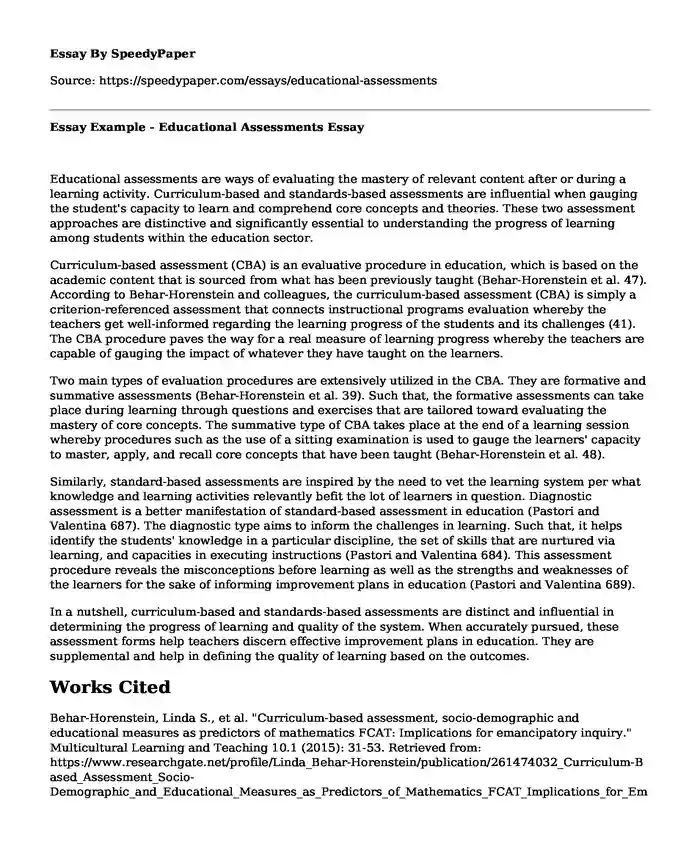Educational assessments are ways of evaluating the mastery of relevant content after or during a learning activity. Curriculum-based and standards-based assessments are influential when gauging the student's capacity to learn and comprehend core concepts and theories. These two assessment approaches are distinctive and significantly essential to understanding the progress of learning among students within the education sector.
Curriculum-based assessment (CBA) is an evaluative procedure in education, which is based on the academic content that is sourced from what has been previously taught (Behar-Horenstein et al. 47). According to Behar-Horenstein and colleagues, the curriculum-based assessment (CBA) is simply a criterion-referenced assessment that connects instructional programs evaluation whereby the teachers get well-informed regarding the learning progress of the students and its challenges (41). The CBA procedure paves the way for a real measure of learning progress whereby the teachers are capable of gauging the impact of whatever they have taught on the learners.
Two main types of evaluation procedures are extensively utilized in the CBA. They are formative and summative assessments (Behar-Horenstein et al. 39). Such that, the formative assessments can take place during learning through questions and exercises that are tailored toward evaluating the mastery of core concepts. The summative type of CBA takes place at the end of a learning session whereby procedures such as the use of a sitting examination is used to gauge the learners' capacity to master, apply, and recall core concepts that have been taught (Behar-Horenstein et al. 48).
Similarly, standard-based assessments are inspired by the need to vet the learning system per what knowledge and learning activities relevantly befit the lot of learners in question. Diagnostic assessment is a better manifestation of standard-based assessment in education (Pastori and Valentina 687). The diagnostic type aims to inform the challenges in learning. Such that, it helps identify the students' knowledge in a particular discipline, the set of skills that are nurtured via learning, and capacities in executing instructions (Pastori and Valentina 684). This assessment procedure reveals the misconceptions before learning as well as the strengths and weaknesses of the learners for the sake of informing improvement plans in education (Pastori and Valentina 689).
In a nutshell, curriculum-based and standards-based assessments are distinct and influential in determining the progress of learning and quality of the system. When accurately pursued, these assessment forms help teachers discern effective improvement plans in education. They are supplemental and help in defining the quality of learning based on the outcomes.
Works Cited
Behar-Horenstein, Linda S., et al. "Curriculum-based assessment, socio-demographic and educational measures as predictors of mathematics FCAT: Implications for emancipatory inquiry." Multicultural Learning and Teaching 10.1 (2015): 31-53. Retrieved from: https://www.researchgate.net/profile/Linda_Behar-Horenstein/publication/261474032_Curriculum-Based_Assessment_Socio-Demographic_and_Educational_Measures_as_Predictors_of_Mathematics_FCAT_Implications_for_Emancipatory_Inquiry/links/55eefb7008aedecb68fd871b/Curriculum-Based-Assessment-Socio-Demographic-and-Educational-Measures-as-Predictors-of-Mathematics-FCAT-Implications-for-Emancipatory-Inquiry.pdf
Pastori, Giulia, and Valentina Pagani. "Is validation always valid? Cross-cultural complexities of standard-based instruments migrating out of their context." European Early Childhood Education Research Journal 25.5 (2017): 682-697.Retrieved from: https://www.researchgate.net/profile/Valentina_Pagani2/publication/319414987_Is_validation_always_valid_Cross-cultural_complexities_of_standard-based_instruments_migrating_out_of_their_context/links/59c8c9220f7e9bd2c01a34f3/Is-validation-always-valid-Cross-cultural-complexities-of-standard-based-instruments-migrating-out-of-their-context.pdf
Cite this page
Essay Example - Educational Assessments. (2023, Feb 08). Retrieved from https://speedypaper.com/essays/educational-assessments
Request Removal
If you are the original author of this essay and no longer wish to have it published on the SpeedyPaper website, please click below to request its removal:
- Time Management Essay Sample
- Free Essay Sample on Urban Architectures
- Free Essay: Pay Gap Between Women and Men in the Film and Television
- Impact of Musical Interventions on Language and Cognitive Development
- Definition Essay Example - Help and Bridge Terms
- Essay Sample Analyzing Health Challenges in the Caribbean
- Essay Example on Creating Communication Theory
Popular categories





